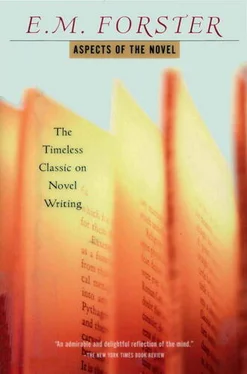THESEare some lectures (the Clark lectures) which were delivered under the auspices of Trinity College, Cambridge, in the spring of 1927. They were informal, indeed talkative, in their tone, and it seemed safer when presenting them in book form not to mitigate the talk, in case nothing should be left at all. Words such as "I", "you", "one", "we", "curiously enough", "so to speak", "only imagine", and "of course" will consequently occur on every page and will rightly distress the sensitive reader; but he is asked to remember that if these words were removed others, perhaps more distinguished, might escape through the orifices they left, and that since the novel is itself often colloquial it may possibly withhold some of its secrets from the graver and grander streams of criticism, and may reveal them to backwaters and shallows.
***
The text of this reissue of Mr. Forster's brilliant discussion is unchanged from the original edition of 1927. No attempt has been made to bring up to date the few topical references, mainly in footnotes, affected by the passage of time.
THISlectureship is connected with the name of William George Clark, a fellow of Trinity. It is through him we meet today, and through him we shall approach our subject.
Clark was, I believe, a Yorkshireman. He was born in 1821, was at school at Sedbergh and Shrewsbury, entered Trinity as an undergraduate in 1840, became fellow four years later, and made the college his home for nearly thirty years, only leaving it when his health broke, shortly before his death. He is best known as a Shakespearian scholar, but he published two books on other subjects to which we must here refer. He went as a young man to Spain and wrote a pleasant lively account of his holiday called Gazpacho: Gazpacho being the name of a certain cold soup which he ate and appears to have enjoyed among the peasants of Andalusia: indeed he appears to have enjoyed everything. Eight years later, as a result of a holiday in Greece, he published a second book, Peloponnesus. Peloponnesus is a graver work and a duller. Greece was a serious place in those days, more serious than Spain, besides, Clark had by now not only taken Orders but become Public Orator, and he was, above all, travelling with Dr. Thompson, the then Master of the college, who was not at all the sort of person to be involved in a cold soup. The jests about mules and fleas are consequently few, and we are increasingly confronted with the remains of Classical Antiquity and the sites of battles. What survives in the book—apart from its learning—is its feeling for Greek countryside. Clark also travelled in Italy and Poland.
To turn to his academic career. He planned the great Cambridge Shakespeare, first with Glover, then with Aldis Wright (both librarians of Trinity), and, helped by Aldis Wright, he issued the Globe Shakespeare, a popular text. He collected much material for an edition of Aristophanes. He also published some sermons, but in 1869 he gave up Holy Orders—which, by the way, will exempt us from excessive orthodoxy. Like his friend and biographer Leslie Stephen, like Henry Sidgwick and others of that generation, he did not find it possible to remain in the Church, and he has explained his reasons in a pamphlet entitled The Present Dangers of the Church of England. He resigned his post of Public Orator in consequence, while retaining his college tutorship. He died at the age of fifty-seven, esteemed by all who knew him as a lovable, scholarly and honest man. You will have realized that he is a Cambridge figure. Not a figure in the great world or even at Oxford, but a spirit peculiar to these courts, which perhaps only you who tread them after him can justly appreciate: the spirit of integrity. Out of a bequest in his will, his old college has provided for a series of lectures, to be delivered annually "on some period or periods of English Literature not earlier than Chaucer", and that is why we meet here now.
Invocations are out of fashion, yet I wanted to make this small one, for two reasons. Firstly, may a little of Clark's integrity be with us through this course; and secondly, may he accord us a little inattention! For I am not keeping quite strictly to the terms laid down—"Period or periods of English Literature." This condition, though it sounds liberal and is liberal enough in spirit, happens verbally not quite to suit our subject, and I shall occupy the introductory lecture in explaining why this is. The points raised may seem trivial. But they will lead us to a convenient vantage post from which we can begin our main attack next week.
We need a vantage post, for the novel is a formidable mass, and it is so amorphous—no mountain in it to climb, no Parnassus or Helicon, not even a Pisgah. It is most distinctly one of the moister areas of literature—irrigated by a hundred rills and occasionally degenerating into a swamp. I do not wonder that the poets despise it, though they sometimes find themselves in it by accident. And I am not surprised at the annoyance of the historians when by accident it finds itself among them. Perhaps we ought to define what a novel is before starting. This will not take a second. M. Abel Chevalley has, in his brilliant little manual, [1] Abel Chevalley, Le Roman Anglais de Notre Temps, Oxford University Press, New York.
provided a definition, and if a French critic cannot define the English novel, who can? It is, he says, "a fiction in prose of a certain extent" (une fiction en prose d'une certaine étendue). That is quite good enough for us, and we may perhaps go so far as to add that the extent should not be less than 50, 000 words. Any fictitious prose work over 50, 000 words will be a novel for the purposes of these lectures, and if this seems to you unphilosophic will you think of an alternative definition, which will include The Pilgrim's Progress, Marius the Epicurean, The Adventures of a Younger Son, The Magic Flute, The Journal of the Plague, Zuleika Dobson, Rasselas, Ulysses, and Green Mansions, or else will give reasons for their exclusion? Parts of our spongy tract seem more fictitious than other parts, it is true: near the middle, on a tump of grass, stand Miss Austen with the figure of Emma by her side, and Thackeray holding up Esmond. But no intelligent remark known to me will define the tract as a whole. All we can say of it is that it is bounded by two chains of mountains neither of which rises very abruptly—the opposing ranges of Poetry and of History—and bounded on the third side by a sea—a sea that we shall encounter when we come to Moby Dick.
Let us begin by considering the proviso "English Literature." "English" we shall of course interpret as written in English, not as published south of the Tweed or east of the Atlantic, or north of the Equator: we need not attend to geographical accidents, they can be left to the politicians. Yet, even with this interpretation, are we as free as we wish? Can we, while discussing English fiction, quite ignore fiction written in other languages, particularly French and Russian? As far as influence goes, we could ignore it, for our writers have never been much influenced by the continentals. But—for reasons soon to be explained—I want to talk as little as possible about influence during these lectures. My subject is a particular kind of book and the aspects that book has assumed in English. Can we ignore its collateral aspects on the continent? Not entirely. An unpleasant and unpatriotic truth has here to be faced. No English novelist is as great as Tolstoy—that is to say has given so complete a picture of man's life, both on its domestic and heroic side. No English novelist has explored man's soul as deeply as Dostoevsky. And no novelist anywhere has analysed the modern consciousness as successfully as Marcel Proust. Before these triumphs we must pause. English poetry fears no one—excels in quality as well as quantity. But English fiction is less triumphant: it does not contain the best stuff yet written, and if we deny this we become guilty of provincialism.
Читать дальше












